As soon as you step out of the terminal at Heidar Aliyev airport and into one of a queue of Baku 2015 branded London-style taxis, touching down in the Azerbaijani capital feels like arriving in a vaguely dystopian Truman Show sequel.
The feeling intensifies as you travel past endless digital clocks counting down to the tournament and speed along a highway flanked by the almost finished 65,000 capacity football stadium lit up like the Allianz Arena on one side and a state-of-the art new gymnastics arena on the other. All this for the inaugural European Games in June next year, when more than 6,000 athletes from across Europe (up to 175 from Britain among them) will compete in 20 sports from gymnastics to beach soccer.
Outside Azerbaijan it elicits confused shrugs. Inside, you would think it the biggest sporting event in the world. Ilham Aliyev – who succeeded his father as president in 2003 and was already the head of the national Olympic committee when he did so – sees it as an opportunity to put his country on the sporting map. Until recently, the country’s biggest sporting claim to fame was as the birthplace of Tofiq Bahramov, the linesman who ruled that Geoff Hurst’s second goal in the 1966 World Cup final goal was over the line.
The tumbledown venue named after him will be replaced as the national stadium by the towering new structure being built by the state oil company, Socar, with its 124 executive boxes and obligatory VVIP sections. It is a hive of activity, with staff working round the clock to finish it.
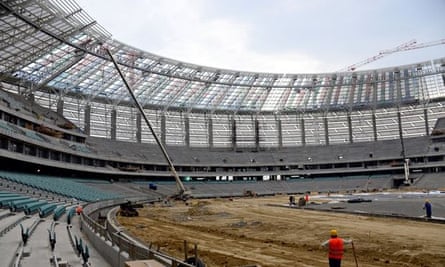
Azad Rahimov, the longstanding minister for youth and sport, is blunt about the reasons for turning black gold into sporting glitter. “The main important thing is to position our country on the map of the world and our country on the map of Europe. The best instrument to do that is sport and culture. Sport has a bigger potential for reaching the most people.” The first lady, Mehriban Aliyeva, is also keen. She has her own suite at that impressive 6,800 capacity National Gymnastics Arena, in which a live-in army of hopeful, young athletes work on their routines day after day.
To its critics the European Games is a huge vanity project for both its organisers and its hosts; to others it is merely the latest signpost towards where global sport is headed. The operational budget is more than £400m and estimates have put the infrastructure spend at £6.5bn, although the government denies the figure is that high. However, the European Games are only the start. The first Baku Formula One race, the latest stage in Bernie Ecclestone’s continuing attempts to tilt his circus towards those countries that will pay handsomely for the kudos it affords them, will roar through the wide streets outside the presidential palace in 2016.
Baku’s new stadium will also play host to four matches at Euro 2020 as part of Michel Platini’s scheme to spread the tournament across the continent. Then there is a Uefa European Under‑17s football championship and, almost certainly, a revived Olympic bid to follow ambitious but failed attempts to reach the shortlisting stage in 2016 and 2020. When Atlético Madrid stormed to the La Liga title last year their shirts bore the legend “Azerbaijan: Land of Fire”. Socar, meanwhile, has signed one of Uefa’s biggest sponsorship deals.
Baku is not a grey post-Soviet cityscape. “If oil is king, Baku is its throne,” wrote the British author JD Henry as long ago as 1905. Its people are hospitable and its wide streets full of history. However, beneath the glitz and sporting glamour, a vicious crackdown on freedom of expression has led to more than 90 arrests on what human rights groups consider to be trumped-up charges. A comprehensive list compiled by activists put the number at 98 in August. Though four have since been released, more have been arrested.
This month, the journalist Khadija Ismayilova, a longstanding thorn in the side of the establishment thanks to her reporting on corruption and human rights abuses, was sentenced to two months’ pre-trial detention on heavily disputed charges of “inciting suicide” in a former colleague. Her arrest has sparked a new wave of outrage. Amnesty International said that it considered the charge to be politically motivated and “the latest attempt to silence her journalistic work in a long history of persecution”.
In Baku two days before her arrest, Ismayilova said she had been routinely harassed by the authorities. She was banned from travelling and said the authorities had rigged up a camera in her bedroom and blackmailed her. Incredulity at such stories soon fades as others tell similar tales of being falsely accused of being Armenian spies and of the harassment or arrest of family and friends.
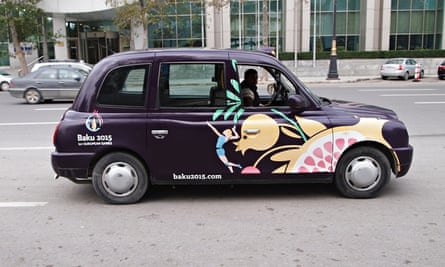
Lawyers who take human rights cases find themselves at risk of being struck off and struggling for other clients. Ismayilova has a mischievous theory as to the motivation behind the dash for sporting events. “We are a kind of a loser nation. We failed in a lot of things in our recent history. These games, the Eurovision song contest, bring us an illusion of victory.” There are also more prosaic reasons, though. “It’s also an opportunity to earn a lot of money. The contracts to build venues, hotels, concert halls, roads are all being given to the president’s families and oligarch’s families.”
Article 19, a London-based human rights organisation, calls Aliyev’s an “oppressive regime, which launched a vicious attack on civil society in Azerbaijan, and in particular those speaking out about political prisoners”. In modern sport, though, money tends to talk and, as with the Beijing Olympics, the $51bn (£32.5bn) Sochi Winter Games or the World Cup in Qatar, part of the rationale employed by the industry that surrounds global sport is that by opening these countries up to the world, it will help spark change.
The argument runs that major sporting events should be seen as an incentive and catalyst for change rather than dangled as a reward for conforming to the west’s view of progress. Simon Clegg, the former head of the British Olympic Association who is now Baku 2015’s chief operating officer, says: “It’s a young country. It’s only 23 years old. What has taken place in 23 years is remarkable really in comparison to other countries.”
This becomes a familiar refrain: this is a young country in an unpredictable part of the world so it is only natural that stability comes before human rights. Give them time. Clegg argues: “Look where they’ve come from – decades of Soviet rule and oppression. You don’t go from there to there overnight. If you do, you end up with chaos and civil disorder.”
Although Azerbaijan has held several elections since regaining its independence, it remains classified as “not free” by Freedom House. Internet access is classified as partly free and its press as not free.
In a swish office block on one side of a sweeping square, a youthful, multinational organising committee staff that will soon number 1,200 busy themselves with the minutiae of hosting a sporting event of this magnitude. Away from the brightly lit offices, however, with their grand chandelier and jolly depictions of the mascots – a pomegranate and a gazelle – there are those who feel very differently.
Natig Jafarli, an economist and the co-founder of the Real opposition party, says: “The institutions of civil society are under oppression in Azerbaijan. The instruments of government passed from father to son. There are more than 90 political prisoners from different spheres. There are no fair elections in Azerbaijan. Our aim is not to get rid of one person, we want systematic change.”
The party’s co-chairman, Ilgar Mammadov, has been in prison for more than 20 months after he was arrested following a critical blog and his detention has been criticised by the European court of human rights. Jafarli adds: “I am not against holding major sporting events in Azerbaijan but our government’s approach is flawed. The Azerbaijan government wants to host such competitions but at the same time doesn’t want the country’s problems to surface.”
Back in Clegg’s office various large flags are propped up in the corner and his coffee table is scattered with glossy brochures produced to promote the games internationally. “Sky’s the limit as Azerbaijan builds for the future” reads one typically breathless headline on an interview with President Aliyev. “I always say seeing is believing, it really is,” enthuses Clegg, waxing lyrical about the charms of Baku. “We’re making it up as we go along. We’re trying to create something unique.”
It is a long way from East Anglia, where Clegg was once Ipswich Town’s chief executive, to the very eastern fringes of Europe. “This is the big bang moment of the European Games. If you are going to have a big bang moment, you’d want the biggest bang possible. Believe me, this is going to be a seriously big bang.”
It is hard not to be sceptical but Clegg and his colleagues have the zeal of true believers. He says: “Look here, there is no national football stadium here at the moment. There is no 50m pool in the whole of Azerbaijan. This is about using the games to fast-track a lot of the infrastructure investment the country needs.”
Around the corner in a hotel lobby, the head of the Azerbaijani Popular Front party, Ali Karimli, paints a grim picture of the frustrations involved in trying to maintain political opposition since the father of the current president came to power in 1993. In that time, he estimates there have been more than 2,000 political prisoners. Karimli has been the subject of a travel ban for nine years, ever since he criticised the current regime at the European parliament, and says the party now has no headquarters after being drummed out of a series of premises.
“They want to build a new image of Azerbaijan as a modern, developed country,” he says. “They want their European guests to be impressed and think they can park all other political problems. But they also want to cancel all opposition and crack down on mass media ahead of the games.”
Thomas de Waal, in his book The Caucasus, writes that when Alyiev came to power in 1993, he “preferred not to experiment with democracy and began to build a strong semi-authoritarian state. The country’s nascent democratic institutions were brought under suffocating control.” If anything, his son has intensified that control.
Baku is a city of surprises, mixing historic ruins with striking modern architecture and the remnants of the utilitarian Soviet era. The oil boom has led to an influx of luxury brands and gleaming Rolls Royce showrooms and upmarket shopping malls studded with Gucci, Lacoste and Prada stores line the streets of downtown Baku. The children of the elite are funded to go to Harvard or Oxbridge. The country is predominantly Muslim but secular in its government. The McDonald’s in the main square blares out Wham’s Last Christmas, the dress code is relaxed.
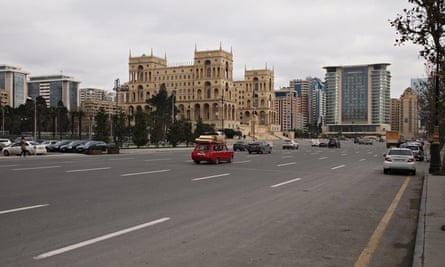
Yet for those who challenge authority through their words or actions, retribution is swift. Turgut Gambar is a member of the Nida youth group and has seen his friends steadily imprisoned over recent months. Nida was established in 2011 to seek democratisation through nonviolent means; at least nine of its members have been arrested on what they insist are trumped-up charges using planted evidence since a peaceful protest in central Baku drew up to 6,000 people in March.
Gambar says that one positive from the sudden drive to host sporting events is the fact that it shines a light on dark corners. “It is an opportunity for us to highlight the human rights problems and what is happening here. But on the other hand, it’s our money and it’s such a dubious way to spend it. We have a fund that is supposed to collect the oil money and invest it for future generations. But they are just frittering it away on Flame Towers and Eurovision and the European Games.”
If the Olympics and the World Cup are the top targets for ambitious rulers looking to make their mark, then beneath them sit cascading tiers of other sporting events that are increasingly sold either as an opportunity to put a country on the map or a stepping stone to landing one of the bigger fish. Enter Pat Hickey, the Irish International Olympic Committee member and head of the European Olympic Committee, who was working up the concept of the European Games, an idea had been mooted since the 1970s but had never taken off for a variety of reasons.
“Two years ago, the European Games didn’t exist. Bit by bit, people are noticing. It’s like a new business – you’re starting from scratch, there’s no history, no tradition,” says Pierce O’Callaghan, who sat on the panel that conducted a European Olympic Committee feasibility study and has ended up moving out to Baku with his family as director of sport. “There’s no point in fooling ourselves, the general public aren’t aware of it. It’s taking time but bit by bit we’ll get there.”
O’Callaghan, whose background is in athletics, says the new games – which will include sports such as three-on-three basketball alongside more traditional disciplines – will also benefit athletes by allowing them to experience a multisport games. Hickey came calling at just the right time for Baku and a marriage of convenience was quickly sealed. The IOC president, Thomas Bach, is also keen for the games to work, calling them the “missing ring” of the movement.
In the belly of the building boom at the aquatics centre, workers are feverishly constructing two 50m pools and a diving tower, flanked by 6,000 seats and housed in a glass palace. An expanse of wasteland beyond the aquatics centre will be preened and sculpted by June into a temporary home for beach volleyball and beach soccer, and yet another structure will host water polo. Outside the aquatics centre, the nodding donkeys are reminders of the source of Azerbaijan’s wealth, dotting the landscape as they do, pulling the oil up from wells.
Yet all of this building activity is for a swimming competition that will feature only junior athletes. The track and field competition will also be suboptimal. Both sports have their own European Championships and could not change their calendar at short notice. O’Callaghan is convinced, however, that they will soon come fully on board: “2019 gives them more time and they’ve both said they want to be part of it In athletics, Azerbaijan will have someone in every race,” he says.
“It works from a local point of view. Does it make a huge impact in the European athletics world? Of course not. In 2019, you’d expect the top seniors in swimming and athletics. For sure.”
When those four Euro 2020 matches – three group-stage games and a quarter‑final – were awarded to Azerbaijan in September, the first question faced by Platini was over the human rights situation in the country. The Azerbaijan FA’s general secretary, Elkhan Mammadov, who has just recruited Robert Prosinecki to try to build a team that can qualify for 2020, argues that through sport Azerbaijan can become a more open country.
Mammadov says: “This is something politicians should deal with. If there is a case involving human rights I’m sure the country is ready to improve and to develop. In any place in the world, if you look carefully, there could be some problems and some issues. That is why we need this kind of event to improve things. I don’t think it’s a big issue for us.”
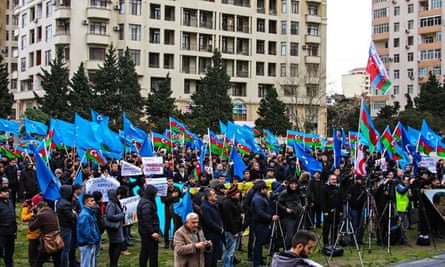
It is not a sentiment with which Necmin Kamilsoy, a softly spoken 19-year-old, would agree. His father, Intigam Aliyev, a prominent human rights lawyer, was arrested and imprisoned this year after taking more than 300 cases to the European courts. His health is deteriorating and Kamilsoy cannot disguise his deep concern. “It’s getting worse every day,” he says. “He has serious diseases in his leg and some thrombosis. He has to have treatment, if he doesn’t he could lose his legs. He was charged with tax evasion, abuse of power and illegal entrepreneurship. It’s ridiculous.”
Nor Gunay Ismayilova, the co-chairperson of the Institute for Reporters’ Freedom and Safety, whose founder, Emin Huseynov, has been missing since August and may be hiding in a foreign embassy. Ismayilova says: “They have searched our offices and sealed them. They have taken all the equipment, all the documents. Our bank account is frozen. This is the worst it has been since 2006. I have a travel ban too. The government doesn’t want anyone to go anywhere and talk about these issues.”According to the Committee to Protect Journalists, standards of press freedom have deteriorated in recent years. “Despite [the] Azerbaijani authorities’ declared commitments to uphold press freedom, they have jailed and harassed critics, adopted laws restricting the press, and imposed draconian restrictions on nongovernmental organizations,” it said.
Nor Gunay Ismayilova’s best friend, Rasul Jafarov, who organised a protest to coincide with the Eurovision song contest in 2012 and was planning a Sport for Democracy movement to coincide with the European Games. He has been in prison for four months without charge.
Nor Leyla Yunus, the longstanding director of the Institute for Peace and Democracy, a well-respected NGO, who was jailed along with her husband, Arif, in July this year in circumstances that are regarded as highly dubious. She is also suffering with ill health.
Nils Muiznieks, the Council of Europe’s commissioner for human rights, says: “If you’re not a political activist or a critical journalist, you can live well enough there. But anyone who is not happy or challenges the regime? No.”
If the rhetoric behind Azerbaijan’s sporting land grab sounds familiar, that is because it is similar to that employed by the Gulf states to justify their spectacular trolley dash for sporting baubles. Like them, Azerbaijan hopes that by investing in sport it will build political, economic and diplomatic capital in the eyes of the rest of the world and prepare for a future beyond gas and oil.
Yet Baku is not Qatar’s Doha, for all the superficial similarities in the modern structures springing out of the ground and the profusion of luxury brands. The mix of pressures in this complex country of 9.4 million people is unique. Rahimov says: “The city is really very beautiful and a fantastic mixture of the old city and the new modern buildings.” That is true, although the contrast between the old, the new and the ramshackle suburbs can jar but not as much as the contrast between the feelgood rhetoric around the games and a human rights record that has made Azerbaijan the target of serious criticism.
Index on Censorship has accused the Aliyev regime of using sport to whitewash its intolerance of free speech. Article 19 responded to the arrest of Ismayilova by calling on the Council of Europe to suspend Azerbaijan.
Yet Rahimov sounds perplexed by the focus on human rights. “Sometimes it’s strange because all the eyes are on Azerbaijan and never on other countries in the world. Maybe the oil and gas makes these organisations blind and focused only on Azerbaijan. We can’t only use one model of democracy in the Middle East, in the west and in different countries. Sometimes the experts on democracy created the problems we have now in Syria, Libya and Iraq. We don’t want to be one of these countries.”
In a world where the CIA’s torture techniques have been roundly condemned and the fallout from the “war on terror” is still unravelling, the moral high ground is hard to identify. Rahimov says human rights organisations and western commentators should “beware of double of standards”. Yet for basic human rights to be disregarded entirely by those bestowing sporting events that espouse values of peace and freedom on host nations seems perverse.
Countries using major sport to burnish their image is not new but the latest trend towards countries using sporting events as an instrument of soft power and investing huge sums in using them as giant billboards to project an airbrushed image to the world feels different. The Fifa general secretary, Jérôme Valcke, nailed his colours to the mast when he said less democracy was “sometimes better” when it came to putting on a World Cup.
The IOC, meanwhile, is wrestling with issues that arose most visibly around Sochi, when protesters against Russia’s new anti-gay laws made life difficult. When countries are so transparently using major events for political ends, it takes a particular kind of myopia to deny the link between sport and politics.
During the 1980s, western companies led by BP sparked a first influx of contractors to make the most of the “Land of Fire”. Now it is stadium architects, PR firms, consultants and the cadre of international citizens who keep the ever expanding calendar of global sporting events on the road who are engaged in a new gold rush.
A London-based agency created the branding that adorns hundreds of taxis and billboards around Baku. The organisers even put out a press release boasting of the involvement of London 2012 veterans in Azerbaijan.Muiznieks says: “I’m not a big fan of boycotts. But I am a big fan of drawing attention to what the country is trying to do and what it is using these events for. Athletes, the media and organisers should look at these issues. Would anybody organise an event in North Korea? I don’t want to compare Azerbaijan to North Korea but it shows you can’t ignore the political and social context of the country in which you’re holding an event.
The country has to be prepared for this kind of scrutiny. If they want to put on their best face, they should put on their best face not only in terms of infrastructure and hospitality but in terms of what is going on in the country.”
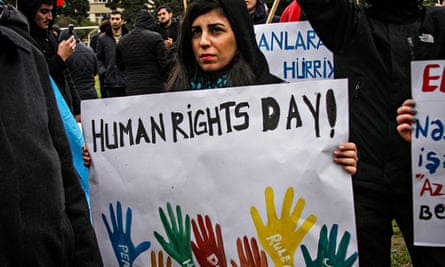
Before her arrest, Khadija Ismayilova said she had no choice but to keep going. “Me and my fellow journalists have been investigating incidents of corruption. But by harassing me personally, putting my life at risk and putting people I train at risk they force me to deal with human rights issues. I’m not comfortable in the shoes of being a human rights activist. I’m being dragged into it.”
For Gunay Ismayilova, 25, giving up is not an option either. “My best friends are in prison. If I stop, I will have betrayed my friends. It is important because if I stop then the government will think that their pressure is working.” As with the other activists, she is hopeful that something good will come of the decision to spend billions of dollars on a sporting event no one has heard of. “If foreign journalists, athletes and other people come here and see the situation and speak about it, that’s better for us.”
Meanwhile, Clegg is convinced the inaugural European Games will be a success. It is easy to see why Baku wants to host it, easy to see why those involved would talk it up and easy to see why the so-called Olympic movement wants to add another event to its ever mushrooming portfolio.
Whether the sporting public will remotely care is very much more open to question. The EOC claims it already has six cities interested in hosting the 2019 edition, though it will not say who they are. “It will become the pre‑eminent multisport senior event in the world. It’s bold but having set a target of fourth place in the medal table six days after getting back from Singapore, I’m not afraid of bold statements,” says Clegg, referring to London winning the Olympic bid in 2005 and their eventual place in the rankings at London 2012.
Lord Moynihan, the former BOA chairman and Tory sports minister who competed in the 1980 Moscow Olympics despite pressure to boycott but refused to take part in the opening and closing ceremonies, says the mantra that sport and politics should remain like oil and water could not hold. “It’s going to have to stop,” he says. “It can’t continue. When you’ve got reporters and human rights campaigners being locked up left, right and centre there are serious questions for sport to answer. Sport can too easily be corrupted to provide a perfect tool for political leaders bent on delivering international recognition through sporting competition. That must be resisted by the multibillion‑pound sports industry.”
Scanning the list of approaching events – from Azerbaijan’s vault on to the world stage to World Cups in Russia and Qatar plus a two-horse 2022 Winter Olympics bid race between Almaty and Beijing – resistance is the last thing on its mind.
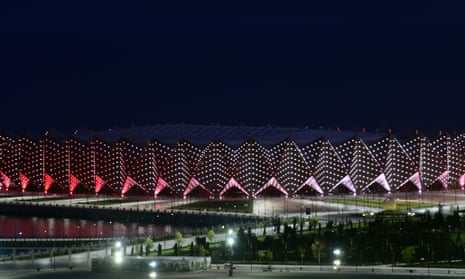
Comments (…)
Sign in or create your Guardian account to join the discussion